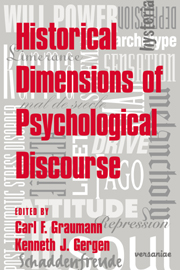Book contents
- Frontmatter
- Contents
- List of contributors
- 1 Psychological discourse in historical context: An introduction
- Part I Disciplining psychological discourse
- Part II History as culture critique
- Part III Early antecedents
- Part IV Lived history
- 13 Emancipation – a failed project? Remarks on the discourse of radical critique
- 14 The transcendental alarm
- Author index
- Subject index
13 - Emancipation – a failed project? Remarks on the discourse of radical critique
Published online by Cambridge University Press: 20 October 2009
- Frontmatter
- Contents
- List of contributors
- 1 Psychological discourse in historical context: An introduction
- Part I Disciplining psychological discourse
- Part II History as culture critique
- Part III Early antecedents
- Part IV Lived history
- 13 Emancipation – a failed project? Remarks on the discourse of radical critique
- 14 The transcendental alarm
- Author index
- Subject index
Summary
A quarter century ago, students of my generation turned to a radical theoretical and practical critique of social science, the university, and society at large. Keenly ambitious to grasp social totality, we rediscovered the radical classics, which had remained in oblivion even after the end of fascism. Sitins, teach-ins, and demonstrations changed our views of history and of society. Critical theory seemed to provide the key to a conscious practical transformation of the world. The nature of social reality as well as the means of changing it became fiercely contested. Before long, students became teachers faced with students who rejected the tyranny of totalization. The dream of social revolution faded in favor of subversion and a concern with the microphysics of power and the state of the subject in the metropoles. In the meantime, the social world around us kept changing rapidly, inconsiderate of the critics' confusion and in utterly unforeseen directions. Will the triumph of market economy and mass migrations from the poorhouses of the world mark the end of critical social theory and its projects for a better society? Or can there be another attempt consciously to make history?
Bewildered by the vicissitudes of the radical discourse on social science, I would like to attempt a self-critical review of the motives and goals, discouragements and regained visions, that inspired, altered, and fragmented the radical project under the impact of changing social conditions.
- Type
- Chapter
- Information
- Historical Dimensions of Psychological Discourse , pp. 243 - 262Publisher: Cambridge University PressPrint publication year: 1996
- 1
- Cited by



